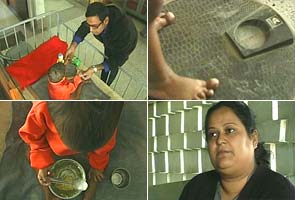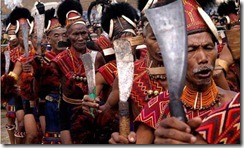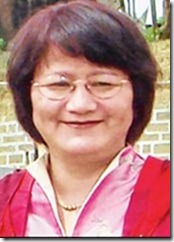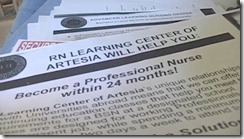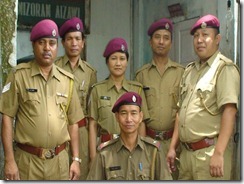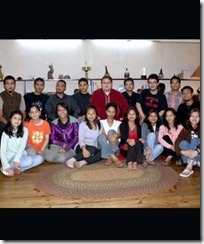As people flow from India's Assam to Bangladesh, debates over migration.
The Assamese struggle to redefine their identity
By Julia E. Evans and Taarika C. Sridhar (Tufts Univ.) 
Students from B.Baruah College intently listen to authors talk about their experience in interacting with the char villagers. (Taarika Sridhar)
ASSAM, India — In the northeast pocket of India lies Assam, an exclave famous for its tea gardens and the Brahmaputra River. Since the 1947 partition of India and Pakistan, and the 1971 independence of Bangladesh, there has been an escalating flow of people between Assam and Bangladesh. The consequence is an increasing debate over migration, and strenuous arguments over what constitutes the Assamese identity.
Local Assamese define themselves as Assamese due to their deep ancestral roots in the land, whereas Bangladeshi immigrants consider themselves Assamese after 30 to 50 years of living and working in the state.
The identity politics crisis results from the rising numerical and political strength of these industrious Bangladeshi immigrants, whom the local Assamese perceive as a threat to the Assamese heritage, way of living, and, most importantly, the Assam identity.
This summer, we traveled to Assam to investigate these questions of identity. We started our journey in Dibrugarh, a city in Upper Assam, which is relatively isolated from identity politics because of its physical distance from the border. However, the debate on Assamese identity remains salient, largely due to the state’s flourishing media.
In conversations at The Sentinel, one of two state-wide English newspapers, local journalists gave us their opinions on current immigration issues. According to reporters Ikbal Ahmed and Subhalakshmi Gogoi, the rising numbers in immigrant populations poses an imminent threat to local political identity.
“By number, they want to make it a Greater Bangladesh,” said Ahmed in a concerned tone. He further explained that the sheer numbers of immigrants encourage politicians to view the immigrant communities as vote banks, diminishing the political voice of the local Assamese. Representing the newspaper’s motto, “Of this land, For its people,” these journalists are charged to inform their readers about issues affecting their political identity.
As we moved into the char villages in Lower Assam, the immigrant communities there presented a stark contrast to Dibrugarh’s mainland setting. Chars are sedimentary islands within the Brahmaputra River, inhabited mostly by immigrant populations dependent on the fertile soil for their livelihoods.
Upon asking villagers whether they consider themselves Assamese, we received confused looks. “I am Assamese,” answered Akel Ali without hesitation. This is a man whose family had moved to Assam before 1950, making the idea of questioning his identity perplexing. Akel’s reaction was not a solitary one. We consistently came across such straightforward responses.
Questions of identity are not a top-of-mind concern of the char villagers. Their concerns involve more simple, short-term needs. As Mohammad Ali, a villager from Gaitapu Island, told us, “All I want is a water pump for my field.” The char’s simple nature was always evident in its bare infrastructure, as well as in conversations with villagers.
During our visit to a char named Moira Challi, we met Jahana Begum, a 20-year-old mother who had received an education only up to the third grade. When discussing her affinity to the state, her lack of education became clear; she did not even know that she lived in a state called Assam. Her only concern was that her family be provided with basic living services from the government — whatever government that might be.
This concern about basic needs, compounded by the lack of education, makes these immigrant populations vulnerable to political exploitation. State politicians depend on the villagers’ limited understanding of civil society and democracy to secure the communities as vote banks. By offering short-term promises of development, politicians appeal to the immediate needs of the villagers and thus gain large numbers of votes.
Yet the reality is that char voters receive much less in terms of social services than the voters of mainland Assam. Government investment in infrastructure remains minimal.
Most islands do not have a school or medical facility. Children often have to walk more than eight kilometers for schooling.
Jahana Begum and other char villagers are also isolated from all forms of media. They do not have access to newspapers, radios or televisions. “I have to travel regularly to the mainland to get information on what is happening in the state,” said Maqbool Hussain, the headmaster of an elementary school in Gaitapu Island.
The pattern of immigrants being used as vote banks highlights the popular mainland fear of Assam becoming a Greater Bangladesh. Since the immigrants live on the periphery of Assamese civil society, they continue to vote as a block, innocently unaware of the perceived threat they pose to mainland Assamese.
The disconnection between the local Assamese and Bangladeshi immigrants (who assert themselves as Assamese) is rooted in the common misperception of the political agenda of char villagers. Geography and paranoia sustained by the media such as The Sentinel limits interaction between the two groups and perpetuates the divide.
There is little to no movement of people from the mainland to the chars, making it difficult for each group to understand the others’ situation. Ajay, a student from B.Baruah College in the capital city, explained, “There is no objective voice. The same stories on immigration repeat themselves again and again. We don’t know what is right or wrong from both the media and politicians’ perspectives.”
Without face-to-face interaction and discussion, finding a common “Assamese” identity would appear to be unobtainable, at least in the short-term.
However, not all Assamese are pessimistic regarding the debate about immigrants and identity. “We want to understand, and we want to help,” was Ajay’s response to our questions on the future of Assamese identity. He and his friends from college explained their ideas for a project targeted towards char village communities. They said their project could be a means to promote interaction between students and immigrant char populations.
We heard a similar openness and idealism in the voices of young boys in the chars. Momin Ali, an eighth-grade student, told of his ideas for change: “I want to complete my education on the mainland. I want to become a politician so I can stop corruption and help develop my char village.”
Momin’s aim is not to impose his identity on politics, as most immigrants are thought to want. His goal is purely altruistic; he aspires to aid the development of his and other char villages.
While both Ajay and Momin and others like them have these ambitions, they are all at a standstill. They lack the support and means of pursuing either a development project or a political career. Ajay dejectedly complained, “The youths are fragmented here.” On the other side, the reality of Momin’s situation inhibits him from getting a higher education within mainland Assam, thus further limiting his political aspirations.
For Assam to realize its full potential, a harmonious identity is imperative. Despite the way in which the Assamese identity divide has been perpetuated, the youth provide an opportunity to bridge these differences and close the large window of misperceptions.
The first step has yet to be taken — interaction between the mainland and the char. Ajay, Momin and their peers are not completely jaded by the prolonged debate on what constitutes an Assamese identity. They understand that a shift of perspective is necessary.
The youths’ ideals diminish the predominant sense of antagonism, and project a refreshing optimism. Only through the empowerment of the youth can a harmonious Assamese identity evolve.
Student Correspondent Corps
![congestion in aizawl_thumb[1] congestion in aizawl_thumb[1]](http://lh6.ggpht.com/_qQQQg0ODhzo/TRLcWOIL_bI/AAAAAAAALB0/2IZ8Ysowa3g/congestion%20in%20aizawl_thumb%5B1%5D_thumb.jpg?imgmax=800) Aizawl, Dec 23 : As many as 1848 vehicles have been registered in this district till November after the garage law come into existence on September one.
Aizawl, Dec 23 : As many as 1848 vehicles have been registered in this district till November after the garage law come into existence on September one.



